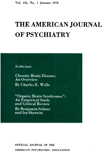CLINICAL EVALUATION OF AZACYCLONOL, CHLORPROMAZINE, AND RESERPINE ON A GROUP OF CHRONIC PSYCHOTIC PATIENTS
Abstract
1. Clinical evaluations of azacyclonol, reserpine, and chlorpromazine were made in turn on the same group of chronic, moderately disturbed, psychotic patients, most of whom revealed schizophrenic reactions maintained through long hospitalization.
2. Beneficial results were obtained with each of the 3 drugs, but not necessarily in the same patients; nor were all patients helped by any one drug.
3. Consideration of the total number of patient improvements in our limited series showed reserpine to be best, closely followed by chlorpromazine, and then by azacyclonol.
4. From the analysis of the results in relation to the different diagnostic categories, it would seem that the hebephrenic and hebephreno-catatoonic patients were helped most by reserpine, next came azacyclonol, while chlorpromazine was least effective. In the treatment of paranoid patients chlorpromazine was most beneficial, followed by reserpine, and then by azacyclonol. The schizo-affective patients exhibited best improvement with chlorpromazine. One case of involutional depression was strikingly benefited by reserpine.
5. Limiting the validity of these conclusions to the types of patients studied we find that it is possible to differentiate between the use of each of these drugs in different psychiatric categories and to indicate the choice of drug that may prove most useful in the treatment of a given case.
Access content
To read the fulltext, please use one of the options below to sign in or purchase access.- Personal login
- Institutional Login
- Sign in via OpenAthens
- Register for access
-
Please login/register if you wish to pair your device and check access availability.
Not a subscriber?
PsychiatryOnline subscription options offer access to the DSM-5 library, books, journals, CME, and patient resources. This all-in-one virtual library provides psychiatrists and mental health professionals with key resources for diagnosis, treatment, research, and professional development.
Need more help? PsychiatryOnline Customer Service may be reached by emailing [email protected] or by calling 800-368-5777 (in the U.S.) or 703-907-7322 (outside the U.S.).



